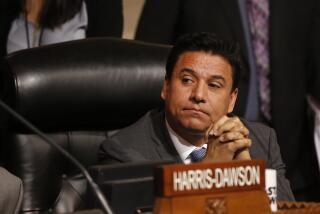Founder of Chinese insurance firm that went on U.S. real estate binge given 18 years in prison
A court in Shanghai sentenced the founder of the Chinese insurance company that owns New York City’s Waldorf Hotel to 18 years in prison on Thursday after he pleaded guilty to fraudulently raising billions of dollars from investors, state media reported.
Shanghai’s No. 1 Intermediate People’s Court also ordered the confiscation of 10.5 billion yuan ($1.6 billion) in assets from Wu Xiaohui, the former chairman of Anbang Insurance Group, which had gained a reputation for ambitiously expanding into hotels, real estate and insurance from Canada to South Korea.
Wu, who founded privately owned Anbang in 2004, has been accused of misleading investors and diverting money for his own use. He was detained last year and regulators seized control of Anbang in February. He was shown on state TV in March admitting guilt.
Wu initially had denied his guilt at his one-day trial, according to an earlier court statement.
According to Xinhua, Wu concealed his ownership of shares in companies controlled by Anbang, filed false statements with financial authorities and lured investors by offering rates of return above that offered elsewhere. Much of the business relied on selling insurance products to raise investment capital.
It said he used more than 100 companies under his control to manage funds and authorities later recovered bank savings, real estate and other assets. Wu used his position to misappropriate 10 billion yuan ($1.5 billion) in Anbang’s deposits, according to Xinhua’s lengthy report.
The company made a big splash in the U.S. when it paid nearly $2 billion in 2014 to acquire the iconic Waldorf Astoria hotel in New York from Hilton. It later spent more than $6 billion to acquire a hotel portfolio from Blackstone Group. Among the properties were the Westin St. Francis hotel in San Francisco and Loews Santa Monica hotel.
Anbang also discussed possibly investing in a Manhattan skyscraper owned by the family of President Trump’s son-in-law and advisor, Jared Kushner. Those talks ended last year with no deal.
The negotiations with Kushner Cos. about 666 Fifth Ave. prompted members of the U.S. Congress to raise ethics concerns.
Xinhua said the court determined the length of the sentence according to the facts of the case, the severity of the crime, and its “degree of social harm.” It said more than 50 people were present at the sentencing, including Wu’s relatives and journalists.
Anbang last month said it was receiving a $9.6 billion bailout from a government-run fund. That would mean the government fund owns 98% of the company, wiping out most of the equity stake once held by Wu and other shareholders.
The Anbang case is one of a string of scandals in what had been a stodgy Chinese insurance industry long-dominated by state-owned insurers. The industry’s former top regulator was charged in September with taking bribes and other insurers have been accused of reckless speculation in stocks and real estate.
The Communist Party has made reducing financial risk a priority this year after a surge in debt prompted rating agencies last year to cut Beijing’s credit rating for government borrowing.
Anbang is being run by a committee of officials from China’s insurance regulator, central bank and other agencies. They have said its obligations to policyholders and creditors are unaffected.
Over the years, Anbang grew to more than 30,000 employees with 35 million clients. It diversified into life insurance, banking, asset management, leasing and brokerage services.
More to Read
Inside the business of entertainment
The Wide Shot brings you news, analysis and insights on everything from streaming wars to production — and what it all means for the future.
You may occasionally receive promotional content from the Los Angeles Times.










